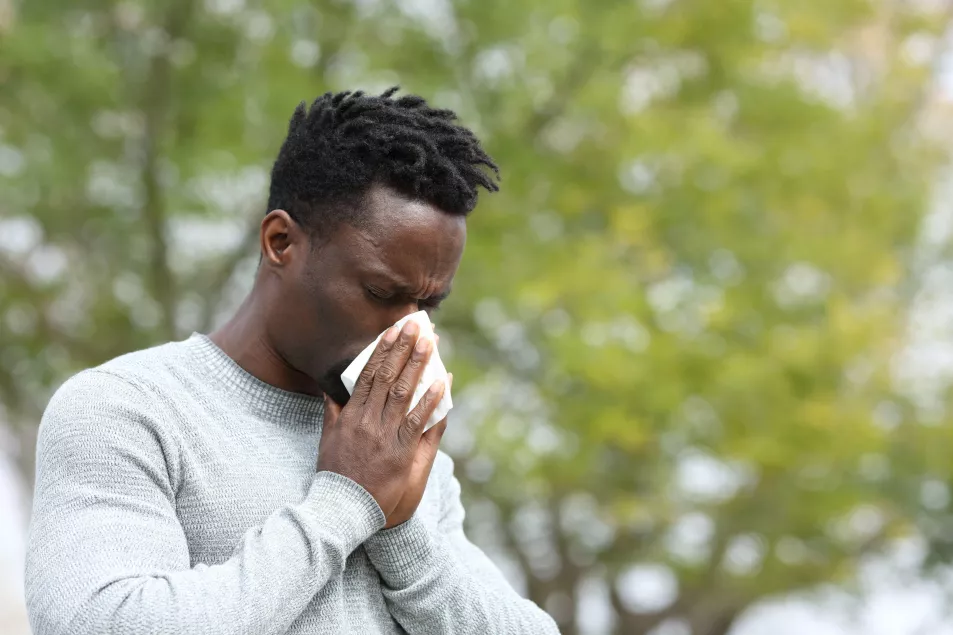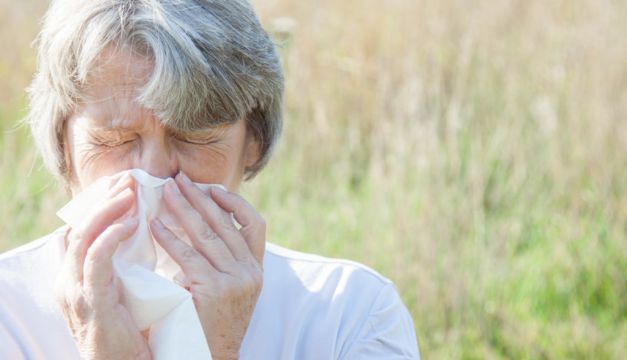Struggling to shift a pesky cold again? Wondering why your eyes are also feeling irritated, along with endless sniffles?
If this sounds familiar, it might be that you don’t actually have a cold at all, but hay fever is causing your symptoms – especially now we’re well into spring.
Symptoms can overlap but it’s helpful to know which one you’ve got, so you can manage it appropriately. So, how can you tell whether you’ve got a cold or hay fever?
What is the difference between a cold and hay fever?
They’re caused by different things, firstly. Colds are caused by a virus that’s spread from one infected person to another. Hay fever, meanwhile, is not contagious, as it’s an allergic reaction some people have to pollen.

“Pollen is a fine dust that disperses in the wind to reach other plants for pollination and start new plants,” explains Claire Nevinson, Boots superintendent pharmacist.
“Tree pollen counts are highest between late March and mid-May, while grass and weed pollen counts are highest between mid-May and September. If you have hay fever, you’re most likely to experience symptoms when the pollen count is high.”
When are your symptoms happening?
Noticing patterns with the timing of your symptoms can also help indicate whether it’s hay fever. Do symptoms usually appear during pollen season, and get worse you go outside? However, viruses are still around during spring and summer, so the time of year doesn’t rule out a cold entirely.
“Colds can still occur during warmer months, and usually involve sneezing and coughing, along with a sore throat, headache and sometimes a loss of taste and smell,” says Nevinson.
Are there differences in symptoms?

Many of the symptoms can be similar, but there are also tell-tale differences between a cold and hay fever. “Hay fever doesn’t cause a high temperature,” says Nevinson, “and most people do not feel unwell.”
Some people’s hay fever can be quite severe though, so how badly affected you are can vary.
Another key indicator is duration of symptoms. “A cold usually lasts one to two weeks, while hay fever can last for weeks or even months, depending on the pollen count,” notes Nevinson. “The higher the pollen count, the worse the symptoms are likely to be.”
The key symptoms of hay fever, Nevinson adds, include: “Sneezing, a runny or blocked nose, itchy red watery eyes or an itchy throat.”
Coughs are generally more associated with colds than hay fever, as well as general aches and pain, possibly a fever and a sore throat.
Both colds and hay fever cause runny nose and sneezing. Both can also cause people to feel more tired and fatigued than usual.
But with a hay fever, you are also likely to experience itchy, red and watery eyes, Nevinson points out. In some cases, hay fever may also be associated with feeling breathless, especially if you also have asthma.
Do you need to treat them differently?
Yes. There’s no cure for the common cold, so here it’s about symptom management, depending on how unwell you feel.
“For a cold, you should rest and drink plenty of fluids,” says Nevinson. “You could also consider taking a cold symptom relief product – these often include medicine for pain relief to help with aches, alongside a decongestant to help ease a blocked nose. If the product contains paracetamol, make sure you don’t take any other paracetamol-containing products at the same time.”

With hay fever, taking steps to help keep pollen at bay is also key.
“Consider putting a barrier balm, such as petroleum jelly, around the nostrils to trap pollen, and wear wraparound sunglasses to help keep pollen out of your eyes,” suggests Nevinson.
“There are a range of hay fever relief products available – from tablets to nasal sprays – and you can always speak to your pharmacist to find which products are suitable for you.”
If over-the-counter remedies are not helping, check in with your GP, as some people may need more support with managing allergies. Your local pharmacists can also advice on treatments if you are unsure.







